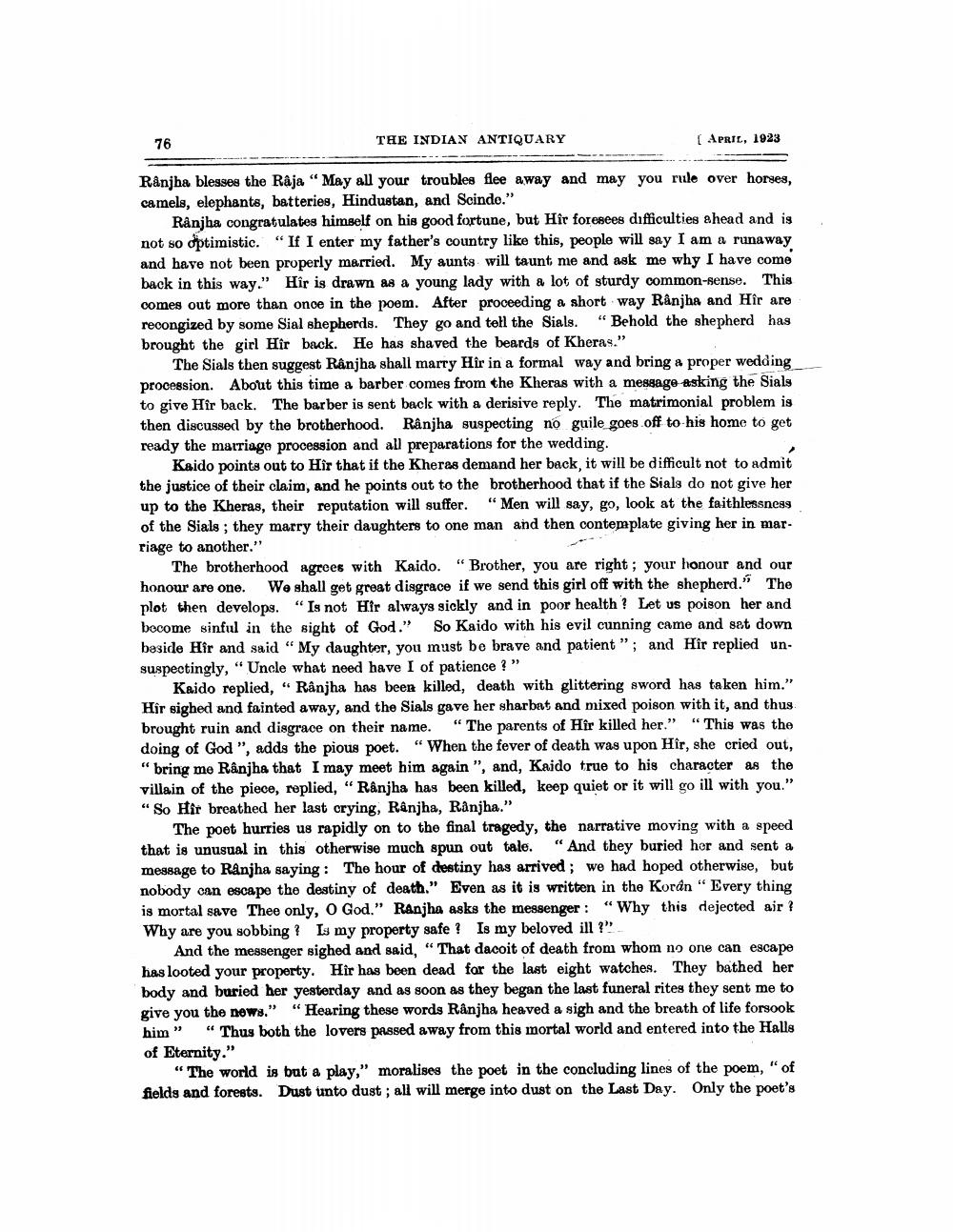________________
76
THE INDIAN ANTIQUARY
( APRIL, 1923
Ranjha blesses the Raja "May all your troubles flee away and may you rule over horses, camels, elephants, batteries, Hindustan, and Scinde."
Ranjha congratulates himself on his good fortune, but Hir foresees difficulties ahead and is not so optimistic. "If I enter my father's country like this, people will say I am a runaway and have not been properly married. My aunts will taunt me and ask me why I have come back in this way." Hir is drawn as a young lady with a lot of sturdy common sense. This comes out more than once in the poem. After proceeding a short way Ranjha and Hîr are recongized by some Sial shepherds. They go and tell the Sials. "Behold the shepherd has brought the girl Hir back. He has shaved the beards of Kheras."
The Sials then suggest Ranjha shall marry Hîr in a formal way and bring a proper wedding procession. About this time a barber comes from the Kheras with a message asking the Sials to give Hîr back. The barber is sent back with a derisive reply. The matrimonial problem is then discussed by the brotherhood. Ranjha suspecting no guile goes off to his home to get ready the marriage procession and all preparations for the wedding.
Kaido points out to Hîr that if the Kheras demand her back, it will be difficult not to admit the justice of their claim, and he points out to the brotherhood that if the Sials do not give her up to the Kheras, their reputation will suffer. "Men will say, go, look at the faithlessness of the Sials; they marry their daughters to one man and then contemplate giving her in marriage to another."
The brotherhood agrees with Kaido. "Brother, you are right; your honour and our honour are one. We shall get great disgrace if we send this girl off with the shepherd. The plot then develops. "Is not Hir always sickly and in poor health ? Let us poison her and become sinful in the sight of God." So Kaido with his evil cunning came and sat down beside Hir and said “My daughter, you must be brave and patient"; and Hir replied unsuspectingly, “Uncle what need have I of patience ?”
Kaido replied, “Ranjha has been killed, death with glittering sword has taken him." Hir sighed and fainted away, and the Sials gave her sharbat and mixed poison with it, and thus brought ruin and disgrace on their name. " The parents of Hîr killed her." "This was the doing of God", adds the pious poet. “When the fever of death was upon Hîr, she cried out, "bring me Ranjha that I may meet him again ", and, Kaido true to his character as the villain of the piece, replied, “Ranjha has been killed, keep quiet or it will go ill with you." “So Hir breathed her last crying, Ranjha, Ranjha."
The poet hurries us rapidly on to the final tragedy, the narrative moving with a speed that is unusual in this otherwise much spun out tale. "And they buried her and sent a message to Ranjha saying: The hour of destiny has arrived; we had hoped otherwise, but nobody can escape the destiny of death." Even as it is written in the Korån "Every thing is mortal save Thee only, O God." Ranjha asks the messenger: "Why this dejected air ? Why are you sobbing? Is my property safe? Is my beloved ill?".
And the messenger sighed and said, "That dacoit of death from whom no one can escape has looted your property. Hir has been dead for the last eight watches. They bathed her body and buried her yesterday and as soon as they began the last funeral rites they sent me to give you the news." "Hearing these words Ranjha heaved a sigh and the breath of life forsook him” “Thus both the lovers passed away from this mortal world and entered into the Halls of Eternity."
"The world is but a play," moralises the poet in the concluding lines of the poem, "of fields and forests. Dust unto dust; all will merge into dust on the Last Day. Only the poet's




